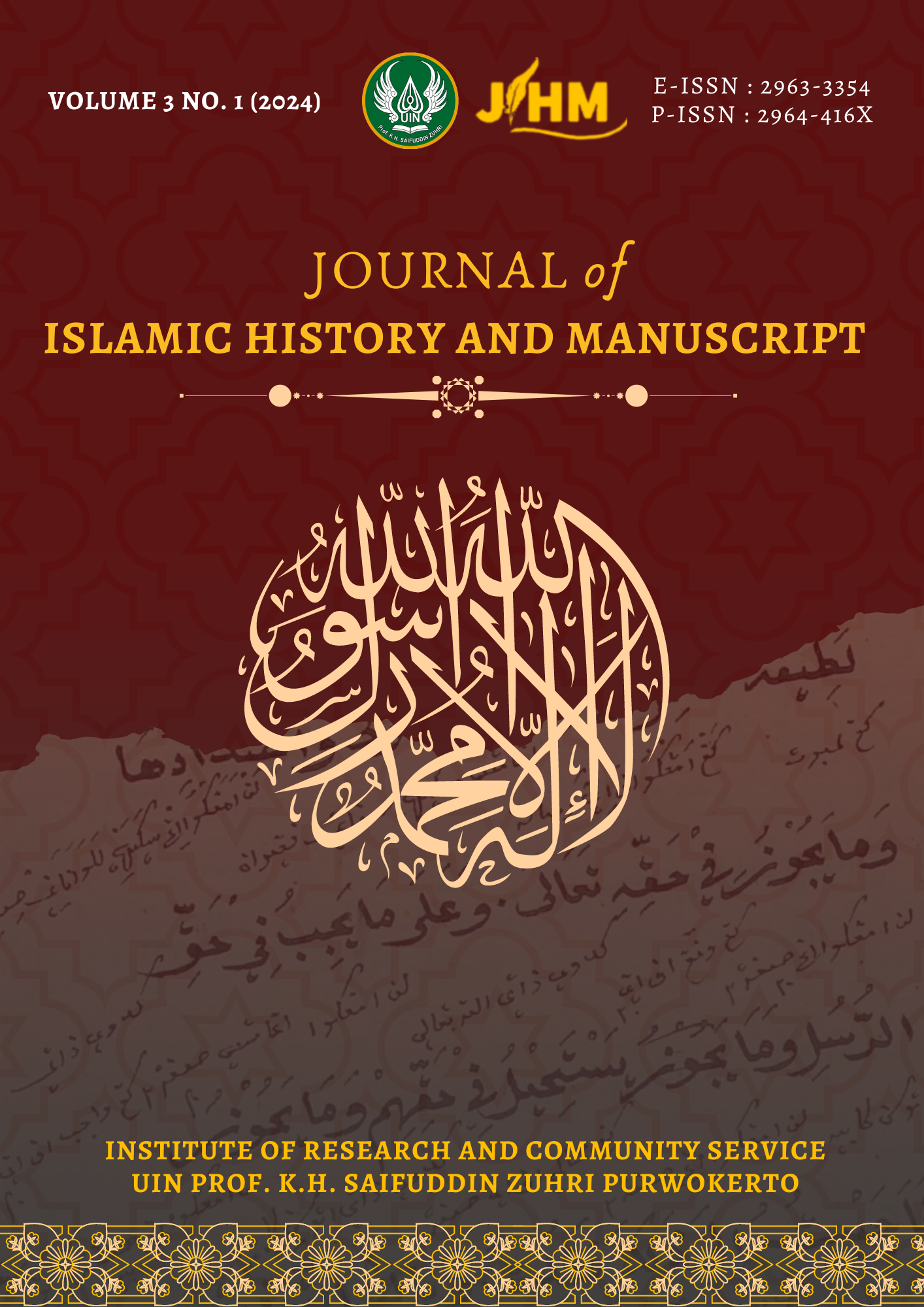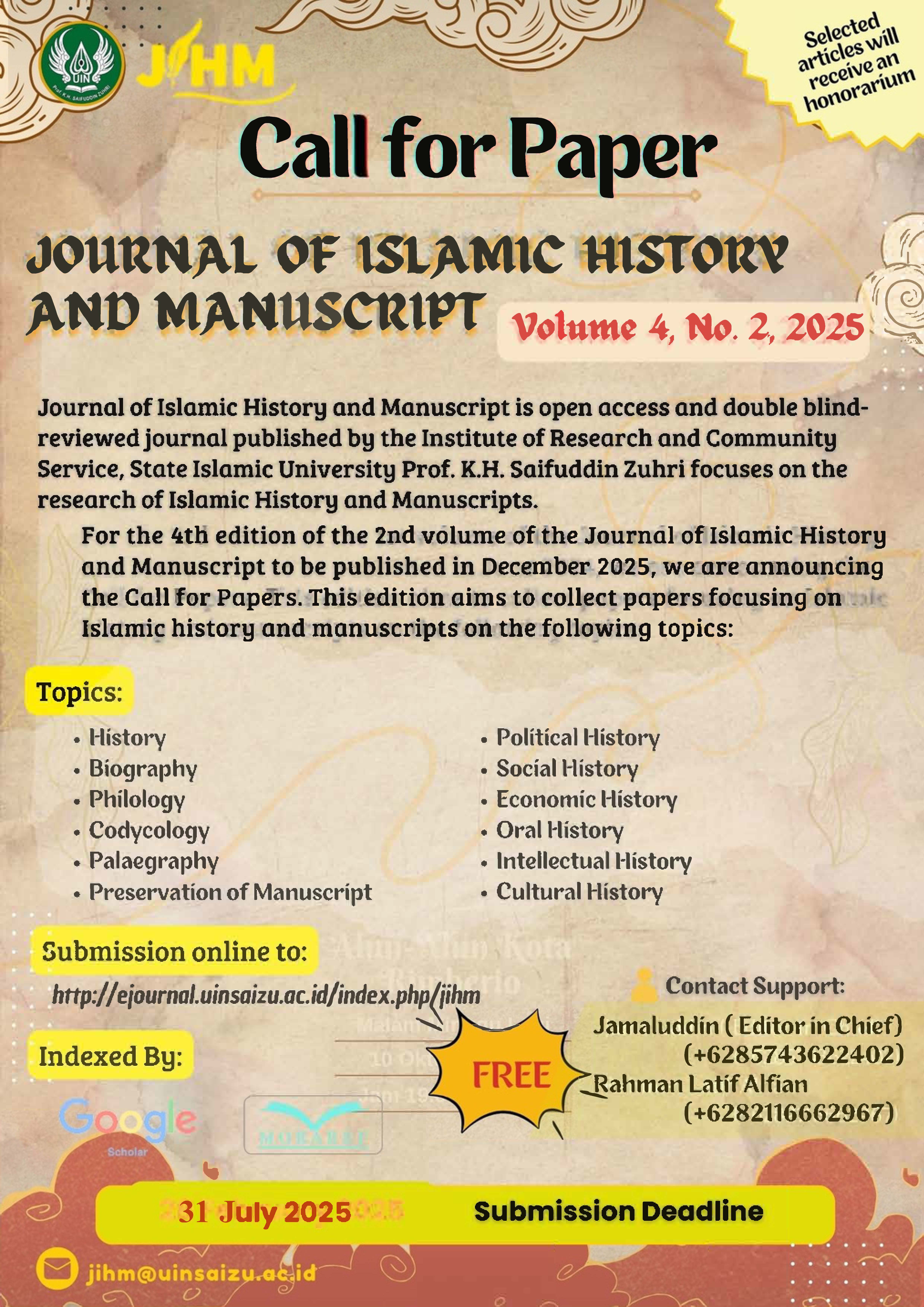Idris Bidlisis Prefatory Poem to Hast Bihist VI: Editio Princeps and Translation
DOI:
https://doi.org/10.24090/jihm.v3i1.9457Kata Kunci:
Ottoman, Arabic, Idris Bidlisi, Hast Bihist, Murad IIAbstrak
A historian of Kurdish origin, Idris Bidlisi (1457-1520), is undoubtedly one of the most important intellectuals in the Ottoman-Iranian borderland in the late-fifteenth and early-sixteenth centuries. Although his Persian and Arabic works have been the focus of long-standing historical debates, there are as yet few proper, in-depth textual and critical editions. This is particularly true regarding Bidlisis Persian history of the first eight Ottoman sultans called Hast Bihist (The Eight Paradises) and especially its unpublished Book VI. This paper provides an editio princeps of Bidlisis Arabic prefatory poem to Book VI and its English translation.Referensi
Anon, A. (1989). Gazavat-i Sultan Murad b. Mehemmed Han, eds. H. inalcik and M. Oguz. Turk Tarih Kurumu.
Ansari, Abdallah. (2007). Tabaqat al-sufiyya. Tus.
Adil, O. (1925). Tevarih-i Al-i Osman (Die fruhosmanichen Jahrbucher des Urudsch). Orient-Buchhandlung Heinz Lafaire.
Beg, T. (1977). Tarih-I Ebu l-Feth. Baha Matbaasi.
Bidlisi, I. ibn Husam al-Din. (n.d.). Hast Bihist.
Bidlisi, I. ibn Husam al-Din. (1888). Mirʾat al-gamal.
Bidlisi, Husam al-Din Ali. (n.d.). Gami al-Tanwil wa-l-ta’wil. Suleymaniye Kutuphanesi, Sehid Ali Pasa.
Bidlisi, Idris ibn Husam al-Din. Hast Bihist, Istanbul, Suleymaniye Kutuphanesi, Esad Efendi 2199.
Bidlisi, Idris ibn Husam al-Din. Hast Bihist, Istanbul, Suleymaniye Kutuphanesi, Nuruosmaniye 3209.
Bidlisi, Idris ibn Husam al-Din. Hast Bihist, Istanbul, Suleymaniye Kutuphanesi, Halet Efendi ilavesi 191.
Bidlisi, Idris ibn Husam al-Din. Hast Bihist, Istanbul, Topkapi Sarayi Muzesi Kutuphanesi, Hazine 1655.
Bidlisi, Idris ibn Husam al-Din. Hast Bihist, Tabriz, Kitabhana-yi Markazi-yi Tabriz, Magmu’a-yi H. Hussein Nakhdjvani, MS 1874.
Bidlisi, Idris ibn Husam al-Din. Hast Bihist, Istanbul, Istanbul Universitesi Nadir Eserler Kutuphanesi, F 619.
Bidlisi, Idris ibn Husam al-Din. Hast Bihist, Berlin, Staatsbibliothek zu Berlin, Ms. Orient, 3179.
Bidlisi, Idris ibn Husam al-Din. Hasiya ala anwar al-tanzil, Istanbul, Suleymaniye Kutphanesi, Ayasofya 303-M.
Chahanovich, S. (2021). Ottoman Eschatological Enthusiasm: Ps. Ibn al-‘Arabi’s Tree of Nu’man as an Early Modern Islamic Esoteric Apocalypse in the Service of Empire. Harvard University.
Fallahzadeh, M. (2014). The Eight Paradises (the Hasht Bihisht) and the Question of the Existence of Its Autographs. Der Islam, 91(2), 374–409.
Genc, V. (2019). Acem’den Rum’a Bir Burokrat ve Tarihci: Idris-i Bidlisi (1457-1520). Turk Tarih Kurumu.
ibn Haggag, M. (1999). Sahih Muslim. Dar ibn Hazm.
Imazawa, K. (2005). Idris Bitlisi’nin Hest Bihist’inin Iki Tip Nushasi Uzerine Bir Inceleme. Belleten, 69, 859–896.
Iraj, A. (2000). 555 Nusha-yi Farsi-yi Tarih dar Kitabhana-ha-yi Istanbul. Nama-Yi Baharistan, 1(1), 47–60.
Kafadar, C. (2007). A Rome of One’s Own: Reflections on Cultural Geography and Identity in the Lands of Rum. Muqarnas, 24(1), 7–25.
Markiewicz, C. (2014). The Crisis of Rule in Late Medieval Islam: A Study of Idris Bidlisi (861-926/1457-1520) and Kingship at the Turn of the Sixteenth Century. The University of Chicago.
Nasir al-Din Tusi, M. ibn M. (1984). Tansuh-nama-yi Ilhani. Ittilaʿat.
Na’im, M. (1943). Dar al-Qur’an. Al-Afaq, 11, 41–55.
Ragib Isfahani, Husayn ibn Muhammad. (1991). Mufradat Alfaz al-Qurʾan. Dar al-Qalam.
Reindl, H. (1983). Manner um Bayezid: Eine prosopographische Studie uber die Epoche Sultan Bayezid II. (1481-1512). K. Schwartz Verlag (Islamkundliche Untersuchungen 75).
Sadiqzada Vayqan, ‘Ali. (2015). Fihrist-i Nusha-ha-yi Hatti-yi Kitabhana-yi Markazi (Milli)-yi Tabriz. Mirat, 6(7), 83–108.
Sayyid Yunisi, M. W. (2014). Fihrist-i Nusha-ha-yi Hatti-yi Kitabhana-yi Markazi-yi Tabriz. Sutudih.
Tauer, F. (1932). Les manuscrits persans historique des bibliotheques de Stanboul, IV. Archiv Orientalni, 4, 92–107.
Tezcan, B. (2009). The Multiple Faces of the One: The Invocation Section of Ottoman Literary Introductions as a Locus for the Central Argument of the Text. Middle Eastern Literatures, 12(1), 27–41.
Unduhan
Diterbitkan
Cara Mengutip
Terbitan
Bagian
Lisensi
Hak Cipta (c) 2024 Mustafa Dehqan

Artikel ini berlisensi Creative Commons Attribution 4.0 International License.
Authors who publish in this journal agree to the following terms:
- Authors retain copyright and grant the journal right of first publication with the work simultaneously licensed under a Creative Commons Attribution 4.0 International License. that allows others to share the work with an acknowledgment of the work's authorship and initial publication in this journal.
- Authors can enter into separate, additional contractual arrangements for the non-exclusive distribution of the journal's published version of the work (e.g., post it to an institutional repository or publish it in a book), with an acknowledgment of its initial publication in this journal.
- Authors are permitted and encouraged to post their work online (e.g., in institutional repositories or on their website) before and during the submission process, as it can lead to productive exchanges and earlier and greater citation of published work (See The Effect of Open Access).

















